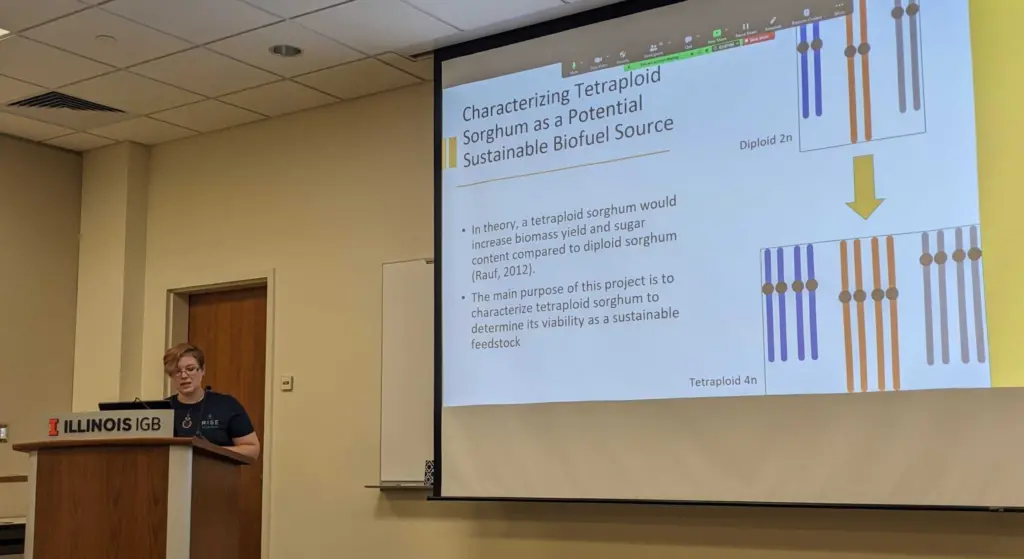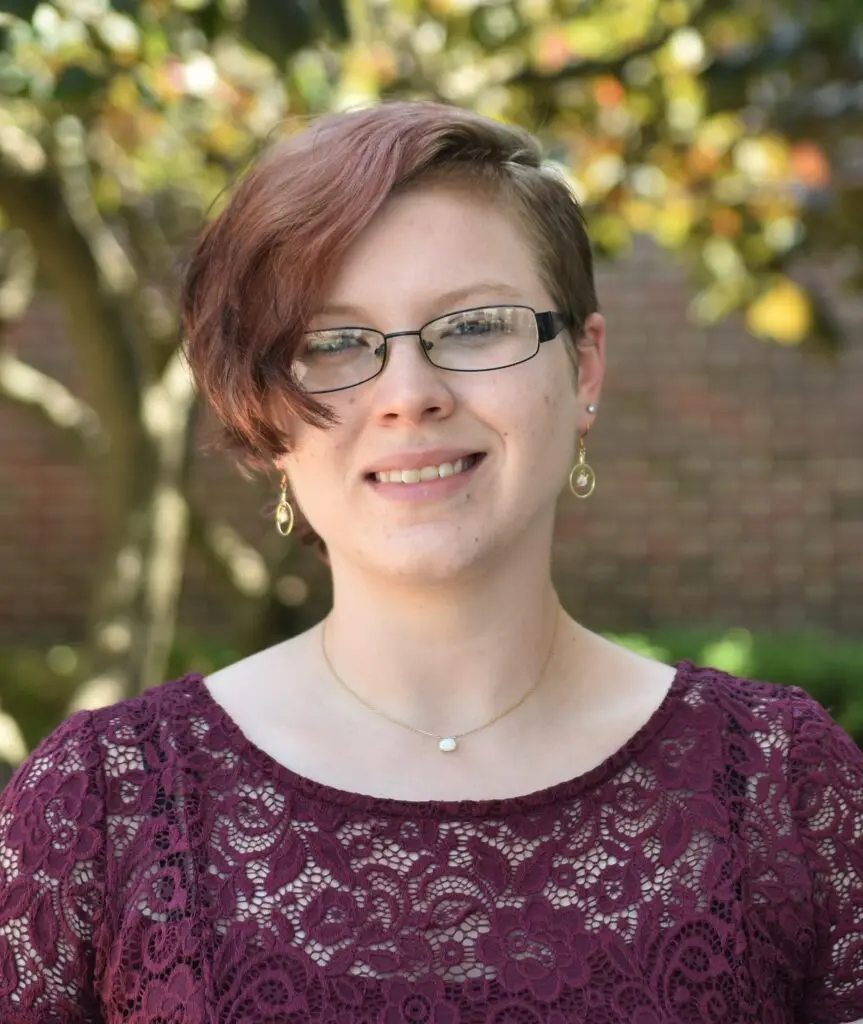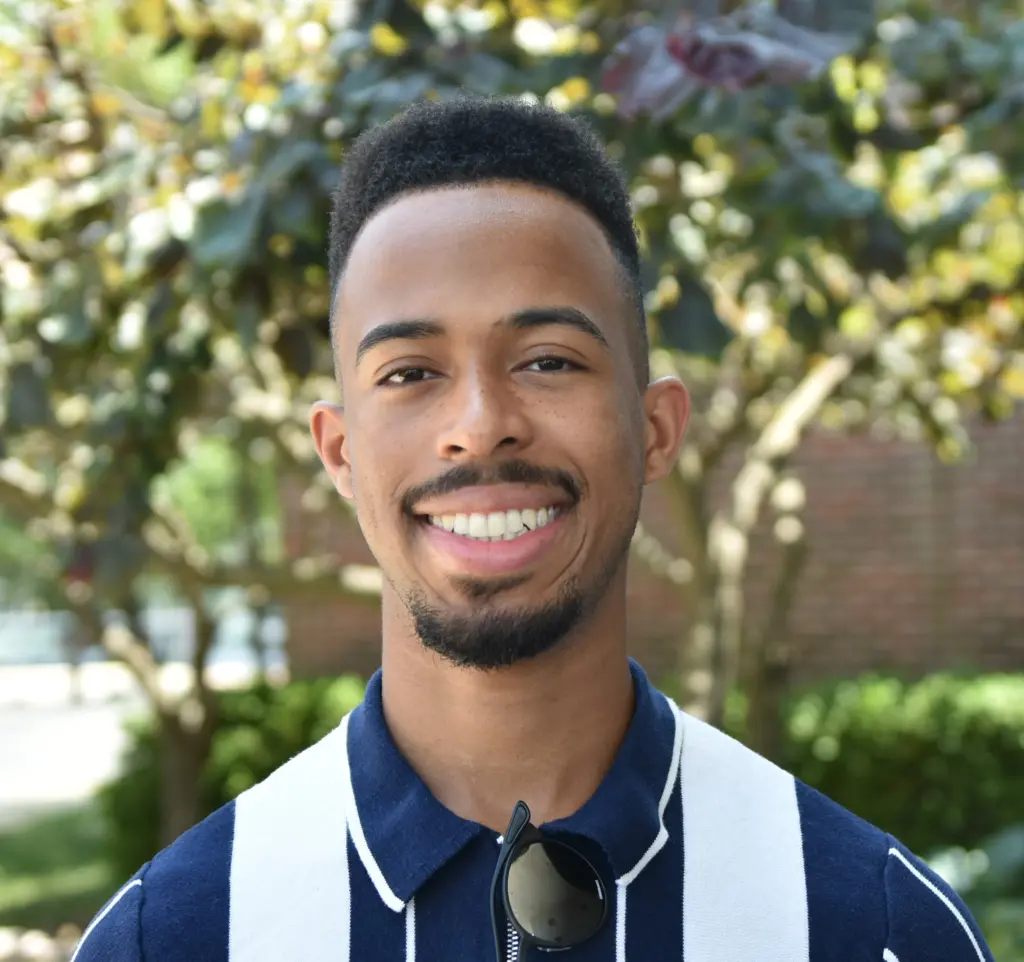
Whether she was out in the field, working in the lab, analyzing data, or networking with other researchers, Jo Thompson found new experiences around every corner during her internship this summer.
A Microbiology student at Parkland College, Thompson is one of eight student interns to participate in the annual Research Internship in Sustainable Bioenergy (RISE) in summer 2023. RISE is hosted by the Center for Advanced Bioenergy and Bioproducts Innovation (CABBI), and offers bioenergy research and career development opportunities for undergraduates from groups underrepresented in STEM.
During this 10-week paid internship program, students were paired with a CABBI mentor and worked on a research project. They gained experience in plant biology, agronomy, synthetic biology, genetics, environmental sciences, chemical engineering, or civil & environmental engineering. In addition to their research projects, students also participated in a series of seminars on STEM career options, graduate school, the research process, and science communication.
Coming from across the country, the 2023 RISE cohort worked at five CABBI sites: the University of Illinois Urbana-Champaign, Iowa State University, the University of Florida, the University of Nebraska at Lincoln, and HudsonAlpha Institute of Biotechnology in Huntsville, Ala. Each student received a $5,000 stipend, and housing and travel were provided.

For Thompson, RISE was an opportunity to explore her options and ease into working in a research setting.
“This was a new experience for me,” she said. “I’ve worked in a lot of labs; I used to be a certified nursing assistant, and I’ve taken a bunch of courses where there’s labs involved, but I’ve never gotten to direct my own research.”
Thompson worked with mentors Liz Dominguez Mendez and Mae Mercado and CABBI Feedstock Production Theme Co-PI Tony Studer this summer. Her research project focused on exploring and characterizing tetraploid sorghum — a new sorghum variety that has double the usual number of chromosomes — and its potential as a sustainable biofuel.
With guidance from Dominguez Mendez and Mercado, Thompson learned and applied valuable research skills, from DNA and RNA extractions, to stomatal imaging, to research writing.
“It was a great first research experience,” Thompson said. “I got to do important work that has real-world applications, and Liz and Mae helped make it really approachable. And I hope to apply this experience with RISE to future research I do as well.”
Fellow RISE Intern Joshua Hardy, a Biological Engineering student at Purdue University, felt similarly.

“I think RISE is a great opportunity to get your foot in the door,” he said. “As an undergraduate, you’re really looking for that first research experience that cascades into all these other opportunities and things you can do.”
Hardy worked with mentor Michael Millican and CABBI Sustainability Theme Co-PI Adina Howe at Iowa State University this summer. His research focused on how microbes in the soil and rhizosphere of bioenergy crops interact and control the nitrogen cycle. In particular, he helped develop pipelines for cultivating rare and difficult-to-grow microbes at the Sustainable Advanced Bioeconomy Research (SABR) station at Iowa State.
In the context of day-to-day work, Hardy has taken and processed soil samples from the SABR fields, and used those samples to grow bacteria for analysis. Like Thompson, RISE was Hardy’s first research experience — and the learning process was fruitful for both mentor and mentee alike.
“I’ve gotten to, from the ground up, teach Josh some of the microbiology I’ve spent years working on,” Millican said. “It’s exciting to see someone learning something that you’ve been doing for so long. You get to see it through a whole new lens. You have to get creative and explain it in a way that’s approachable.”
The connections the interns have made this summer, both in and out of the lab, will provide them with a strong foundation for future research endeavors and networking.
“I’ve really enjoyed meeting not just the people in the lab, but also the people in the community,” Hardy said. “They’ve all been very accommodating and welcoming. And I think one of the most exciting things for me throughout this experience was getting to meet the other RISE students. All their work is very interesting and they’re nice people, too.”
The RISE program concluded Aug. 4 with a research symposium at Illinois. Interns gave presentations about the work they did over their 10-week internship.
“It’s important to me to be able to present my research in a way that could be understood by people both in and outside the field,” Hardy said. “Ultimately, that’s the goal with making things marketable and communicating them to a greater audience: making sure they can be easily understood by all those people.”
The other 2023 RISE interns and their projects:
- Elaine Guel, who worked with mentor Sanbon Gosa and Feedstock Production PI Andrew Leakey (Illinois) on evaluating transgenic sorghum plants for greater water use efficiency;
- Galit Baraja, who worked with mentor Shivali Banerjee and Conversion Co-PI Vijay Singh (Illinois) on the recovery of anthocyanins from bioenergy crops;
- Dayja Johnson, who worked with mentor Zhengyi Zhang and Conversion Co-PI Huimin Zhao (Illinois) on examining photoenzymatic reactions using YersER;
- Fatima Vazquez, who worked with mentor Qasim Ali and Feedstock Production Co-PI Fredy Altpeter (Florida) on direct embryogenesis in energy cane genetic transformation;
- Carlos Bucio, who worked with mentor Kiyoul Park and Feedstock Production Co-PI Edgar Cahoon (Nebraska) on redesigning and improving TAG in sorghum;
- Brenda Marcial, who worked with mentor Brandon James and Feedstock Production Co-PI Kankshita Swaminathan (HudsonAlpha) on studying cellulose synthase gene expression in sorghum.